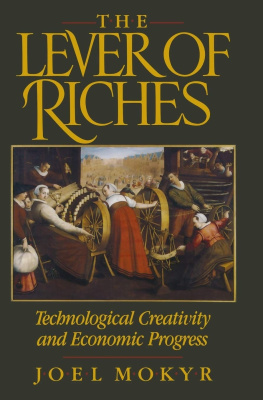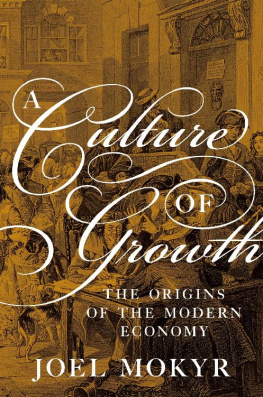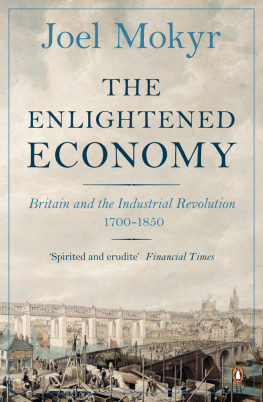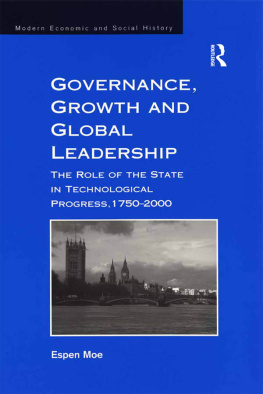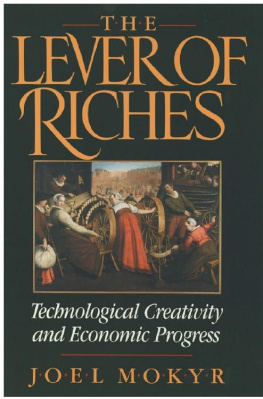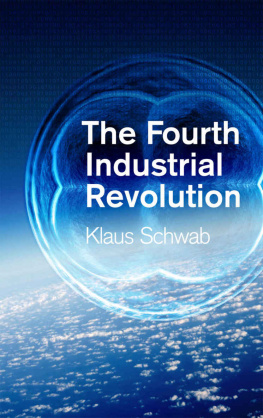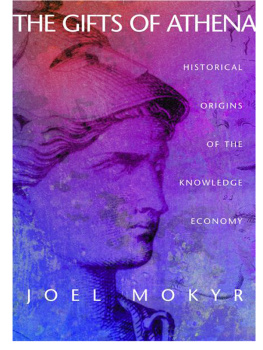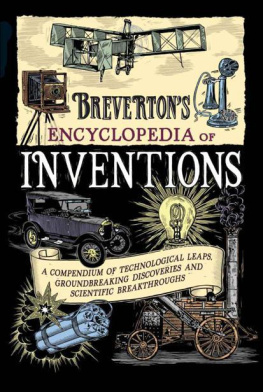
The Lever of Riches
THE LEVER
OF RICHES
Technological Creativity
and Economic Progress
JOEL MOKYR





To the Memory of My Mother Who did it all by Herself
Preface
This is a book about technological creativity. Why would an economic historian write such a book? Technology is about how to make things and services that are useful and enjoyable, that is, it is about production. The difference between rich nations and poor nations is not, as Ernest Hemingway said, that the rich have more money than the poor, but that rich nations produce more goods and services. One reason they can do so is because their technology is better; that is, their ability to control and manipulate nature and people for productive ends is superior. If the West is on the whole comfortable, even opulent, compared to the appalling poverty still rampant in most of Asia and Africa, it is in large part thanks to its technology. As one author has put it, we have to "give credit to just those (lull, everyday, pragmatic, honest betterments in simple technology... that were taking place in Europe... doses of' which would wash away much of the misery in the world today" (,Jones, 1981, p. 69). Western technological superiority has deep historical roots, and can only be understood-if at all-by an analysis that is willing to look back centuries, even millennia. To be sure, technology cannot take all the credit: the development of law, trade, administration, and institutions were all part of the story. Yet, as I shall try to show, technological creativity was at the very base of the rise of the West. It was the lever of its riches.
How does technology change? Like science and art, it changes through human creativity, that rare and mysterious phenomenon in which a human being arrives at an insight or act that has never been accomplished before. Of' course, technological creativity is quite different from artistic or scientific creativity. It tends to be more downto-earth, with such mundane characteristics as dexterity and greed at the center of the act. Yet it does share with the arts and the sciences its occasional dependence on inspiration, luck, serendipity, genius, and the unexplained drive of people to go somewhere where none has gone before. Although sonic portion of invention comes today from the cold and calculating minds of' Research and Development engineers in white lalxoats worn over three-piece-suits, much of the technological creativity that made our economic world what it is came from different sources. I will make an effort to describe and then explain this creativity. However, it is a task that can never be carried out completely. At some level we stand in uncomprehending awe before the miracle of human genius. We can no more "explain" the breakthroughs inside the minds of a Montgolfier or a Westinghouse than we can explain what went on inside the head of Beethoven when he wrote the Eroica. Economists and historians alike realize that there is a deep difference between porno economicus and homo creativus. One makes the most of' what nature permits him to have. The other rebels against nature's dictates. "Technological creativity, like all creativity, is an act of rebellion. Without it, we would all still live nasty and short lives of toil, drudgery, and discomfort.
It is always a pleasant task to thank the many friends and colleagues who have made this book possible, and are responsible in some way for many of the arguments and opinions expressed in it. As my name appears on the title page and theirs do not, however, I alone shall carry the blame for all errors and misstatements and suf- f'er the wrath of the wronged and misquoted.
The project began many years ago when my former colleague F. Michael Scherer walked into my office at the Northwestern University Economics Department and proposed a "small monograph" on the history of technological progress that., he assured me, would take me at most a few months over the summer to write. I (lid not buy the Brooklyn Bridge from him that afternoon, but I did make a promise that would result in many long nights in libraries and in front of' my wordprocessor. Mike has thus sown the seed for this book, and while it was I who had to carry it to term, lie has been supportive and helpful throughout the project. I can only hope that the readers will not hold anything in this book against him.
Intellectually, the inspiration for this book came from a variety of sources, many of' which I cannot recall. Teaching economic history for fourteen years means that one inevitably absorbs large amounts of information that cannot possibly be traced to their sources. A number of' books, however, stick out as I find myself going back to them again and again for insight, inspiration, and information. They are David Landes' Unbound Prometheus, Lynn White's Medieval Religion and Technology, Eric Jones's European Miracle, Abbott Payson Usher's History of Mechanical Inventions, and Donald Cardwell's Turning Poinl.s in Western Technology.
Of my Northwestern colleagues, I would like to mention those who have not only read the manuscript in its numerous half-baked versions and gave me good advice and encouragement, but also provided the comradeship and emotional support few can do without. They are Louis Cain, Charles Calomiris, Karl de Schweinitz, Jack Goldstone, David Hull, Jonathan R. T. Hughes, and Sarah Maza. Many of my graduate students, upon whom successive versions of the manuscript were inflicted, made valuable contributions. Among them, I am particularly grateful to Katherine Anderson, Avner Greif, Paul Huck, Lynne Kiesling, John Nye, Gabriel Sensenhrenner, I)an Shiman, Richard Szostak, and Martha Williams. I have come to realize the profound truth in Rabbi Akiva's famous dictum, that he learned much from his teachers, more from his colleagues, and most from his students.
Outside Northwestern, my greatest debt as always is to Cormac 0 Grada, whose almost legendary patience and wisdom have been an indispensable resource to me for many years now. The manuscript was read by an embarrassingly long list of other friends, who found an equally embarrassing list of errors and omissions, and made many invalid complaints, the most vociferous of which was that I did not write the hook they would have if they had written it. This list contains Robert C. Allen, William Baumol, Reuven Brenner, Julia Burns, Paul A. David, Jan I)e Vries, Stefano Fenoaltea, George Grantham, C. Knick Harley, Dan Headrick, Eric Jones, William McNeill, Donald McCloskey, William N. Parker, Richard Szostak, Andrew Watson, K. 1). White, and Bing Wong. A conference of the All University of California group in Economic History in October 198 discussed an earlier version of" this hook and provided me with many good ideas, not all of which I could carry out.
My research assistant Eriklehender loyally assisted me in plundering the shelves of the Northwestern Libraries for three years, as well as provide the Interlibrary Loan office with a medium run increase in the demand for their services. Mrs. Barbara Karni edited the manuscript with her usual thoroughness and competence. Mr. Herbert Addison at Oxford University Press contributed generously from his knowledge of hooks and publishing to this hook in its final stages. The secretaries at the Northwestern department of' economics, Mrs. Angie Campbell, Mrs. Ann Roth, and Mrs. Florence Stein, have given me their help and support over many years. A special debt is acknowledged to Mr. Jack Repcheck of Princeton University Press.
Next page
